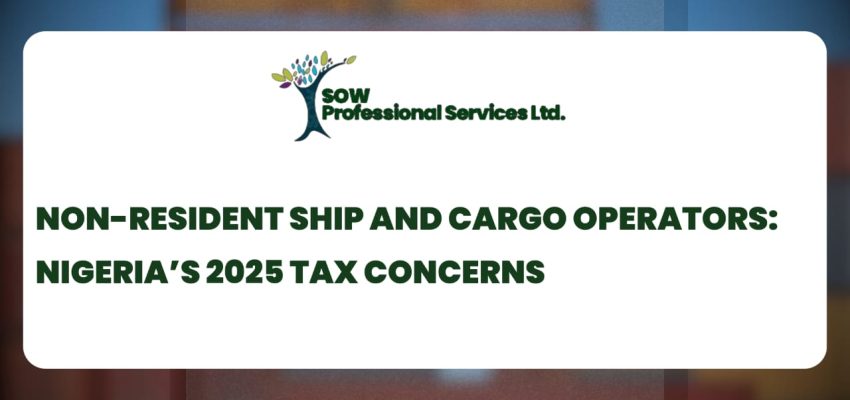Non-Resident Ship and Cargo Operators
Non-Resident Ship and Cargo Operators
Nigeria’s 2025 Tax Concerns
Foreign airlines and shipping companies have always played a major role in Nigeria’s economy.
Whether moving passengers, livestock, or goods, these operators generate significant revenue
from Nigerian activities. For years, taxation in this sector was guided by the Companies
Income Tax Act (CITA). However, with the introduction of the 2025 Tax Administration Act,
the rules have tightened.
If you are a non-resident transport operator, this change directly affects how you do business in
Nigeria.
The Old Rule: Annual Returns under CITA
Before 2025, Section 14 of CITA governed how foreign transport companies were taxed.
● Who was affected? Any foreign airline or shipping line carrying passengers, goods, or
mail from Nigeria. If the ticket or freight was sold in Nigeria, the revenue was taxable.
● How was tax calculated? While companies could declare actual profits, the Federal
Inland Revenue Service (FIRS) often relied on a deemed profit basis, taxing 2% of the
gross revenue from Nigerian operations.
● When were filings made? Returns were filed once a year, like other companies in
Nigeria. There was no monthly breakdown or obligation to submit invoices to the tax
authority.This system worked but had gaps. It allowed delayed compliance, made revenue monitoring
difficult, and often led to disputes over the accuracy of declared figures.
The New Rule: Monthly Filing under the 2025 Act
The Tax Administration Act, 2025 introduces a more structured compliance framework for
non-resident sea and air transport operators. Here’s what’s new:1. Monthly returns: Operators must now file returns every month, no later than the 21st
day of the following month.
the rules have tightened.
If you are a non-resident transport operator, this change directly affects how you do business in
Nigeria.
The Old Rule: Annual Returns under CITA
Before 2025, Section 14 of CITA governed how foreign transport companies were taxed.
● Who was affected? Any foreign airline or shipping line carrying passengers, goods, or
mail from Nigeria. If the ticket or freight was sold in Nigeria, the revenue was taxable.
● How was tax calculated? While companies could declare actual profits, the Federal
Inland Revenue Service (FIRS) often relied on a deemed profit basis, taxing 2% of the
gross revenue from Nigerian operations.
● When were filings made? Returns were filed once a year, like other companies in
Nigeria. There was no monthly breakdown or obligation to submit invoices to the tax
authority.This system worked but had gaps. It allowed delayed compliance, made revenue monitoring
difficult, and often led to disputes over the accuracy of declared figures.
The New Rule: Monthly Filing under the 2025 Act
The Tax Administration Act, 2025 introduces a more structured compliance framework for
non-resident sea and air transport operators. Here’s what’s new:1. Monthly returns: Operators must now file returns every month, no later than the 21st
day of the following month.
Read More about ; Non-Resident Ship and Cargo Operators ;
https://drive.google.com/file/d/1ZVBOQnIeQiLvjBhvooWYdPc6Cr7O4xLG/view?usp=sharing
Get Started Today!
To know more about Non-Resident Ship and Cargo Operators , kindly contact us at :
E-mail: care@sowprofessional.com
Website: www.sowprofessional.com
Phone: 07038254989
Whassapp: 07038254989



